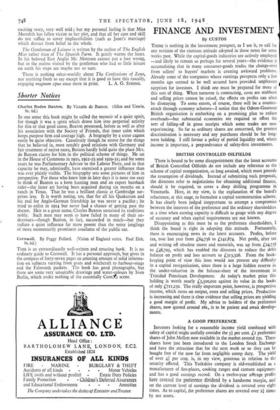FINANCE AND INVESTMENT
By CUSTOS
THERE is nothing in the investment prospect, as I see it, to call for any revision of the cautious attitude adopted in these notes for some weeks past. While the capital-goods industries are actively employed —and likely to remain so perhaps for several years—the evidence is accumulating that in many consumer-goods trades the change-over from sellers' to buyers' markets is creating awkward problems. Already some of the companies whose earnings prospects only a few months ago seemed to be well assured have provided unpleasant surprises for investors. I think one must be prepared for more of this sort of thing. When turnover is contracting, costs are stubborn and selling prices cannot be raised, the effects on profits can often be dismaying. To some extent, of course, there will be a counter- attack through economy schemes—I notice that the Odeon-Gaumont British organisation is embarking on a promising plan to reduce overheads—but substantial economies are required to offset the sort of falling-off in gross receipts which some trades are now experiencing. So far as ordinary shares are concerned, the greatest discrimination is necessary and any purchases should be for long- term holding. I still favour a policy of partial liquidity and, where income is important, a preponderance of safety-first investments.
BRITISH CONTROLLED OILFIELDS
There is bound to be some disappointment that the latest accounts of British Controlled Oilfields do not include any reference to the scheme of capital reorganisation, so long awaited, which must precede the resumption of dividends. Instead of submitting such proposals, the directors refer to negotiations for obtaining additional finance, should it be required, to cover a deep drilling programme in Venezuela. Here, in my view, is the explanation of the board's reluctance, at this stage, to formulate a capital reconstruction scheme. It has clearly been judged inopportune to attempt a compromise between the interests of the preference and the ordinary shareholders at a time when earning capacity is difficult to gauge with any degree of accuracy and when capital requirements are not known.
Disappointing as this must be to the preference shareholders, I think the board is right in adopting this attitude. Fortunately, there is encouraging news in the latest accounts. Profits, before tax, rose last year from £64,738 to £141,874. Net profit, after tax and writing off obsolete stores and materials, was up from £24,738 to £48,705, which has enabled the directors to reduce the debit balance on profit and loss account to £313,326. From the book- keeping point of view this item would not present any difficulty in a capital reorganisation, since there is a large hidden reserve in the under-valuation in the balance-sheet of the investment in Trinidad Petroleum Development. At today's market price this holding is worth nearly £3,5oo,000 against its value in the books of only £711,230. The really important point, however, is prospective income, which turns on output, costs and selling prices. Production is increasing and there is clear evidence that selling prices are yielding a good margin of -profit. My advice to holders of the preference shares, now quoted around 16s., is to be patient and await develop- ments.
A GOOD PREFERENCE
Investors looking for a- reasonable income yield combined with safety of capital might usefully consider the 51 per cent. £r preference shares of John Mollett now available in the market around 23s. These shares have just been introduced to the London Stock Exchange and have the attraction that for the next week or so they can be bought free of the now far from negligible stamp duty. The yield of over 41 per cent, is, in my view, generous in relation to the security offered. -This Yorkshire company is old-established as a manufacturer of fire-places, cooking ranges and canteen equipment and has a good earnings record. On a twelve-year aftrage profits have covered the preference dividend by a handsome margin, and on the current level of earnings the dividend is covered over eight times. As to capital, the preference shares are covered over 24- times by net assets.


































 Previous page
Previous page